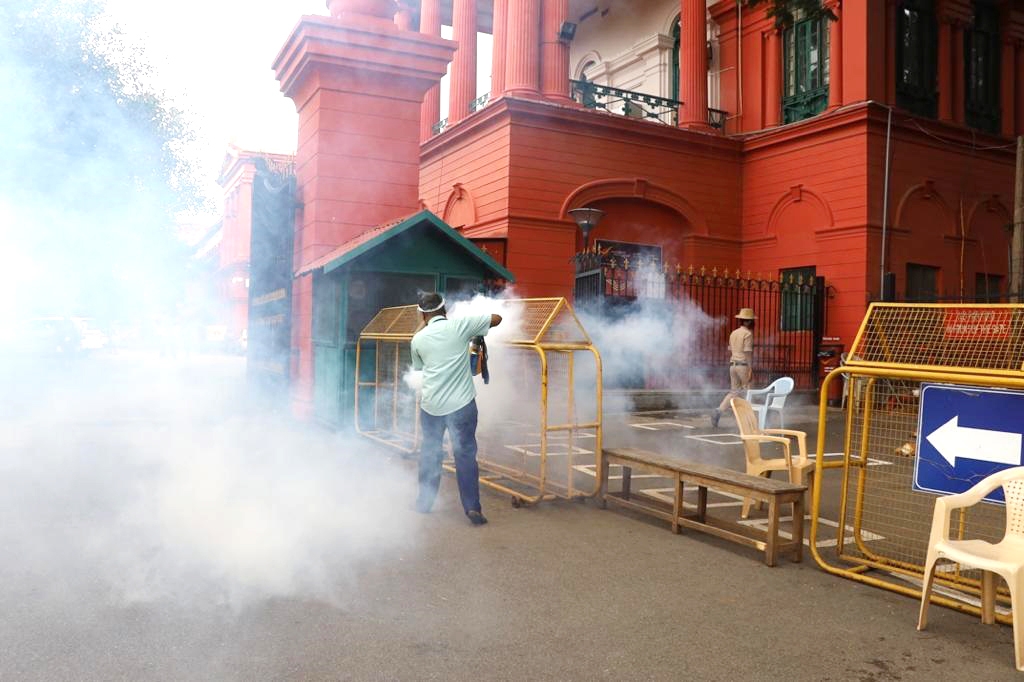A uniform strategy is needed due to lack of coordinated efforts by local govts.
A Delhi-type focus by both the Ministry of Home Affairs (MHA) and the state government to tackle Covid-19 is urgently needed for the three metropolitan cities—Chennai, Bangalore and Hyderabad—which are struggling to keep the spread under control for the last one month. Absence of coordinated efforts by the local governments, too, is a reason for a uniform strategy.
Not surprisingly, the governments in three states—Tamil Nadu, Karnataka and Telangana—have been facing PILs (public interest litigations) in their respective High Courts exposing chinks in their armour in battling the virus spread. There are glaring anomalies at every stage of testing, tracking and treating Covid patients in these three big cities.
Even the Centre is worried over the uncontrolled Covid situation in these cities which are witnessing a steep spike in cases, albeit with a low mortality rates around 3% of the positive numbers. After witnessing the way the National Capital Region has handled and brought down the situation under control this week, Chennai, Bangalore and Hyderabad, too, need to be apply similar strategies.
On Friday, Chennai accounted for 2,027 new positive cases out of 4,343 in Tamil Nadu. With this, the total active cases in Chennai stand at 22,777, and 1,321 deaths. Most parts of Chennai city have been observing voluntary lockdowns since 1 June. The E. Palalinswamy-led AIADMK government has extended the general lockdown till July end, after the state crossed one lakh cases.
The situation in Chennai is so alarming that in many localities, people, mostly traders and shopkeepers, are voluntarily calling for shutdowns since June last week. As a result, though there is no official ban, cabs and taxies are off the roads, thus completely paralysing normalcy. The government has been forced to extend the lockdown till 31 July.
The Greater Chennai Municipal Corporation, which received a large number of returnees from abroad in the last three weeks, has identified around 15 clusters where 80% of positive cases are concentrated. This in a way is useful to the public health officials, but in other ways a curse as police has to use force to keep crowds off the streets. The recent custodial death of a father and son is linked to this situation.
Similar is the situation in Bangalore. On Thursday, the city saw 889 new positive cases, taking the total number to 6,090. The city witnessed some downward trends in the positives for the last few days, but the figure jumped up again, causing alarming to the government. The sensitive areas like IT Corridor and the business hub of MG Road have been completely out of bounds for business activity, due to more cases.
As many as five divisions of Brutah Bengaluru MahanagaraPalike, the civic body of the city, have been placed under a lockdown till 7 July. The divisions—Chamarajpet, Kalasipalya, Chicpet, VV Puram and Byatarayanapuram—have recorded more number of cases in the last fortnight, thus accounting for more containment zones.
Chief Minister B.S. Yedyurappa is personally against to re-imposing lockdown in Bangalore city, but he made it clear that he won’t hesitate to enforce restrictions in case there is no let-up in the situation. The CM is in talks with private hospitals to ramp up the bed capacity and cap a fee package for the Covid patients, but the talks are incomplete.
Hyderabad, one of the Covid hotspots in the country, too, has become unwieldy to the K. Chandrasekhar Rao-led TRS government in Telangana. Though KCR is personally against extending the general lockdown in the Greater Hyderabad Municipal Corporation limits, the health ministry has been seeking one in the wake of a spike in cases for the last few days, which touched 998 per day on Thursday. Hyderabad with some downtown areas where density of population is as high as 35,000 per sq km has become unmanageable to the officials to enforce social distancing and isolation of containment zones since 1 June. This has pushed the total number of cases by ten folds—from a daily figure of 100 to 900, thanks to ramped up testing, which now stand at 4,000 per day. One common feature of all these three cities is a lack of clarity on tracking and treatment of Covid patients. Though help-lines are in place, there are reports that patients or suspected patients are complaining that they couldn’t get admitted to hospitals despite showing symptoms. Tracing has now become just impossible due to the mushrooming number of positive cases, bordering community spread. Only a Delhi-type concerted effort, where a 10,000-bed Covid hospital has been opened and massive testing and awareness drive has been launched after the Centre stepped into rein in the pandemic, can change the situation. A focused and well-coordinated strategy alone can help Chennai, Bangalore and Hyderabad—of course through a joint drive between the Centre and states.

